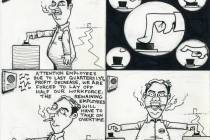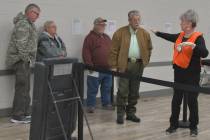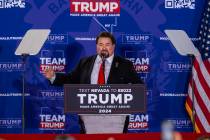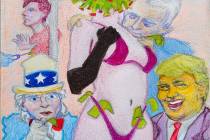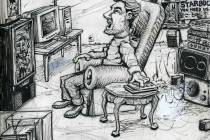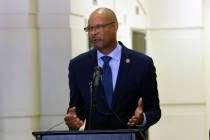Dennis Myers: Why do politicians treat pot smokers as pariahs?
During alcohol prohibition in the United States, there were a variety of ways people could legally drink. There were exceptions for medical reasons, religion loopholes, and others.
It was also legal to drink in one’s own home. People could not BUY booze, but they could drink it in their residences. This made a certain sense in 1919, when alcohol prohibition took effect and a lot of people had unused supplies of alcohol in their homes.
In November 1918, Nevada Attorney General George Thatcher issued a legal opinion saying that if someone stored a supply of alcoholic beverages in his or her home before alcohol prohibition took effect, possession of the stored alcohol would be legal after prohibition kicked in.
But as the years passed it became more and more difficult to make a case that these supplies had not yet been exhausted. Booze had a way of materializing inside homes without benefit of purchase.
There have long been reports that the cocktail party was invented specifically because drinking at home was still legal. This may not be so. As early as April 1917, before prohibition was enacted, a St. Louis social leader named Clara Bell Walsh was reported by a local newspaper to have held a mixed drink party in her home. On the other hand, it may be so.
While 1917 was before prohibition, it was wartime and there was a certain social stigma against drinking because the brewing process used up grain that could be used to feed our fighting men overseas, or so the tale went. Take your pick. Either way, if the Walsh party was first, 2017 would be the centennial year of the cocktail party.
If you’re wondering why I’m wandering down this memory lane, it’s because a legislative lawyer last week issued an opinion saying that nothing is stopping local governments in Nevada from allowing smoking lounges for marijuana from opening.
At the moment, marijuana smokers are being treated the way drinkers were treated during prohibition—they could do it at home and not otherwise. Which raises the question, why? Times have changed and the public has spoken.
Marijuana has long made public officials kind of crazy. Conditioned to accept the mythology of marijuana, they want the revenue from this harmless and even beneficial plant (President Nixon’s marijuana commission reported that marijuana tends “to neutralize criminal behavior and to militate against the commission of aggressive acts”), but they are reluctant to cast any votes that might make them look soft on pot, even with the political cover of a public vote endorsing legal marijuana.
Gov. Sandoval immediately responded to the legislative opinion by opposing any wider location for pot smoking than the home. “I did not support [lounges at the 2016 Legislature],” Sandoval told the Las Vegas Review-Journal. “I don’t support them now. … I think that this might invite more [federal] scrutiny with regard to the sale of recreational marijuana.”
Nevada voters have made it pretty plain that they are willing to face down the feds on this issue and they likely expect their governor to do the same. Nevada has tied the feds up in knots for 40 years or so on the proposed dump for high-level nuclear wastes at Yucca Mountain, and it has both science and state law on its side in the case of marijuana. Why can’t Nevada, joined by other states, do the same thing on marijuana?
It is true that at the moment, the local governments have only the opinion by legislative counsel Brenda Erdoes to go on, and while she is a top-notch attorney, the legislative counsel is not the kind of official anyone would want to hang an ordinance on. There is a long history of legislative counsel opinions being written to accommodate legislators. Nor is Nevada Attorney General Adam Laxalt, who has in the past shown his willingness to ignore the voters’ instructions in ballot measures, a reliable source.
So local governments ought to turn to their own counsel, district attorneys and city attorneys, for legal readings before enacting broader marijuana smoking rules. And the next Legislature should look at taking the wraps off in 2019.
Dennis Myers is an award-winning journalist who has reported on Nevada’s capital, government and politics for several decades. He has also served as Nevada’s chief deputy secretary of state.








